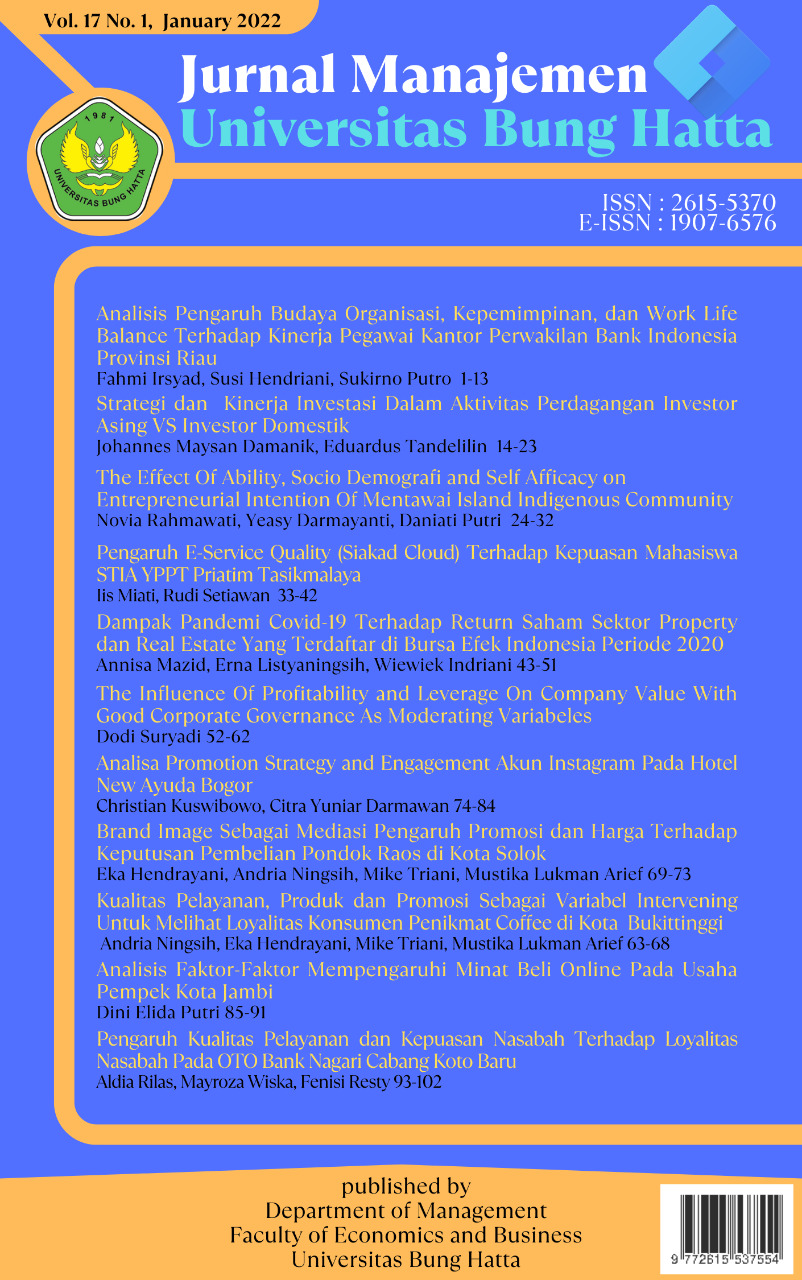THE EFFECT OF ABILITY, SOCIO DEMOGRAFI AND SELF EFFICACY ON ENTREPRENEURIAL INTENTION OF MENTAWAI ISLAND INDIGENOUS COMMUNITY
DOI:
https://doi.org/10.37301/jmubh.v17i1.19967Abstract
This research aims to test the effects of ability, socio demography, self efficacy on entrepreneurial intention of Mentawai Island indigenous community. This research is based on National Labor Force Survey (SAKERNAS) 2014-2016 which describe the number of unemployment, Statement by Regent of Mentawai Island about enterprises in Mentawai Island Regency were more dominated my migrants and foreign workers, Mentawai Island Regency was including in the 122nd underdeveloped regencies in 2015-2019, and development of entrepreneurs is considered as a strategic step in maintaining national economic problems. The number of samples in this study 90 respondents, obtained by using accidental sampling method. Hypothesis testing using multiple regression. Based on testing results in the first hypothesis, it is found out that ability influences significantly on entrepreneurial intention. The second hypothesis shows that socio demography influences significantly on entrepreneurial intension. And the third hypothesis also shows that self efficacy influences significantly on entrepreneurial intension
References
Ajzen, I. (1991). The theory of planned behavior. Organizational Behavior and Human Decision Processes, 50(2), 179–211.
Andika, M., & Madjid, I. (2012). Analisis pengaruh sikap, norma subyektif dan efikasi diri terhadap intensi berwirausaha pada mahasiswa Fakultas Ekonomi Universitas Syiah Kuala. Eco-Entrepreneurship Seminar & Call for Paper" Improving Performance by Improving Environment, 190–196.
Astuti, R. D., & Martdianty, F. (2012). Students’ entrepreneurial intentions by using theory of planned behavior: The case in Indonesia. The South East Asian Journal of Management.
Bandura, A. (1986). Social foundation of thought and action. Englewood cliffs, NJ: prentice Hall.
Basu, A., & Virick, M. (2007). Assessing entrepreneurial intentions among students: A comparative study, Peer Reviewed Papers.
De Pillis, E., & Reardon, K. K. (2007). The influence of personality traits and persuasive messages on entrepreneurial intention: A cross-cultural comparison. Career Development International, 12(4), 382–396. https://doi.org/10.1108/13620430710756762
Drucker, P. F. (1996). Konsep Kewirausahaan Era Globalisasi. Erlangga: Jakarta. Terjemahan.
Feist, J., & Feist, G. J. (2010). Theories of Personality Buku 2 Edisi 7. Jakarta: Salemba Humanika.
Fereidouni, H. G., Masron, T. A., & Nikbin, D. (2010). Consequences of External Environment on. Academy of Management Journal, 15(2), 175–196.
Flanders, N. A., Fishbein, M., & Ajzen, I. (1975). Belief, attitude, intention, and behavior: An introduction to theory and research (Vol. 2089). Addison-Wesley.
Ghozali, I. (2016). Ghozali, Imam.(2016). Aplikasi Analisis Multivariate dengan Program IBM SPSS 23. Semarang: BPFE Universitas Diponegoro. IOSR Journal of Economics and Finance. Https://Doi. Org/Https://Doi. Org/10.3929/Ethz-b-000238666.
Guerrero, M., Rialp, J., & Urbano, D. (2008). The impact of desirability and feasibility on entrepreneurial intentions: A structural equation model. International Entrepreneurship and Management Journal, 4(1), 35–50. https://doi.org/10.1007/s11365-006-0032-x
Kristanto, H., & Heru, R. (2009). Kewirausahaan (Entrepreneurship): Pendekatan manajemen dan praktik. Yogyakarta: Graha Ilmu.
Lee, N. R., & Kotler, P. (2011). Social marketing: Influencing behaviors for good. Sage Publications.
León, J. A. M., Descals, F. J. P., & Domínguez, J. F. M. (2007). The psychosocial profile of the university entrepreneur. Psychology in Spain.
Mahshunah, S. (2010). Hubungan Antara Self Efficacy Dengan Intensi Berwirausaha (Penelitian Pada Siswa Kelas XII SMK Ibu Kartini Semarang). Universitas Negeri Semarang.
McClelland, D. C. (1969). The Achieving Society. Princeton, New Jersey: 1961 Van Nostrand. McClelland, DC & Winter, DG 1969. Motivating Economic Achievement. New York: Free Press.
Nabi, G., Holden, R., & Walmsley, A. 2006. Graduate career-making and busness start-up: a lliterature review. Education + Training.48 (5),
Pribadiyanto, A., & Amboningtyas, D. (2017). Influence Of Ability, Socio Demography, Self Efficacy, And Minimnya Employment Work On Entrepreneurship In Village Community Pringapus Sub District Pringapus Semarang. Journal of Management, 3(3).
Robbins, S. P., & Judge, D. (2007). Perilaku Organisasi, Jakarta: Salemba EmpatBrett, J., Cron, W., & Slocum, J (1995). Economic Dependency On Work: A Moderator Of The RelationshipBetween Organizational Commitment And Performance. Acaderny Of Management Journal, 38, 261–271.
Setiawati, T. (2013). Minat Berwirausaha Ditinjau Dari Lingkungan Keluarga Dan Sikap Terhadap Peluang Usaha Pada Mahasiswa Program Studi Pendidikan Akuntansi Fakultas Keguruan Dan Ilmu Pendidikan Universitas Muhammadiyah Surakarta Angkatan 2010/2011. Universitas Muhammadiyah Surakarta.
Suharti, L, & Sirine, H. (2011). Pengaruh Faktor Sosial Demografi dan Faktor Kontekstual Terhadap Niat Kewirausahaan Mahasiswa. Prosiding Seminar Nasional Kewirausahaan Dan Invasi Bisnis (SNKIB) I, Universitas Tarumanagara Jakarta, 194–222.
Suharti, Lieli, & Sirine, H. (2012). Faktor-faktor yang berpengaruh terhadap niat kewirausahaan (entrepreneurial intention). Jurnal Manajemen Dan Kewirausahaan, 13(2), 124–134.
Walgito, B. (2004). Teori Konvergensi. Jogyakarta: Peneribit Fakultas Psikologi UGM.
Widodo, P. B., & Rusmawati, D. (2004). Studi Korelasi Konsep Diri Dan Keyakinan Diri Dengan Kewirausahaan Pada Mahasiswa Program Studi Psikologi FK Undip Semarang.
Wilson, F., Kickul, J., & Marlino, D. (2007). Gender, entrepreneurial self–efficacy, and entrepreneurial career intentions: Implications for entrepreneurship education. Entrepreneurship Theory and Practice, 31(3), 387–406.
Wulandari, N., & Mudiantono. (2013). Analisis Pengaruh Kualitas Produk, Kualitas Pelayanan dan Lokasi Terhadap Kepuasan Konsumen (Studi Kasus Pada Konsumen KOPIKITA Semarang). Terhadap, Lokasi Konsumen, Kepuasan Kasus, Studi Konsumen, Pada, 2(2), 1–9.
Downloads
Published
Issue
Section
License
Copyright (c) 2022 Novia Rahmawati, Yeasy Darmayanti, Daniati Puttri

This work is licensed under a Creative Commons Attribution-ShareAlike 4.0 International License.
Authors who publish with Jurnal Manajemen Universitas Bung Hatta agree to the following terms:
- Authors retain copyright and grant the journal right of first publication with the work simultaneously licensed under a Creative Creative Commons Attribution-ShareAlike 4.0 International License that allows others to share the work with an acknowledgement of the work's authorship and initial publication in Jurnal Manajemen Universitas Bung Hatta.
- The author holds the copyright of the submitted and published articles, with the understanding that articles are disseminated under the Creative Commons Attribution-ShareAlike 4.0 International License..
- The editor team is entitled to do the editing in accordance with the guidelines for writing or template in the Jurnal Manajemen Universitas Bung Hatta.
This work is licensed under a Creative Commons Attribution-ShareAlike 4.0 International License.












